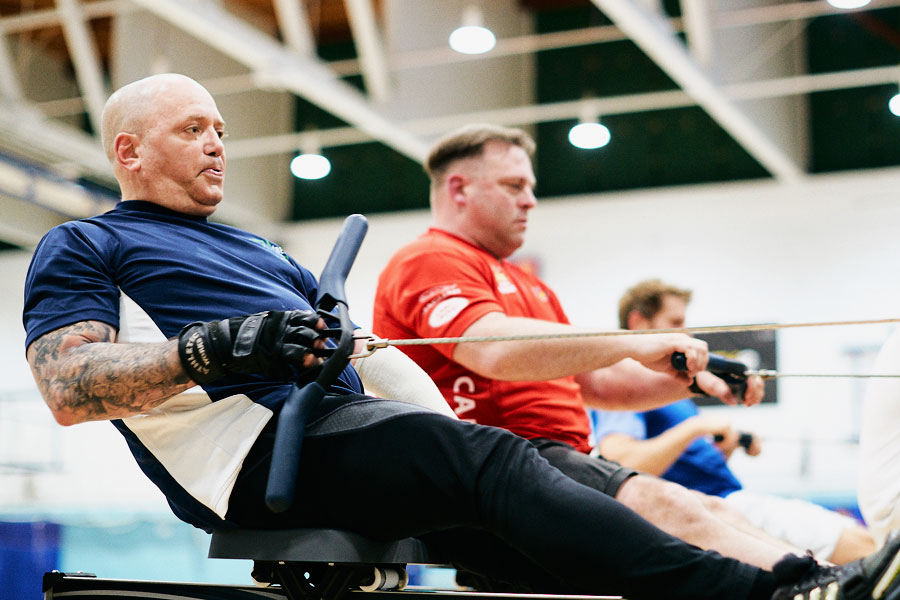Invictus: road to healing begins in Victoria
By Lookout on Apr 19, 2018 with Comments 0

Photo by Lyndon Goveas, CFMWS
Peter Mallett, Staff Writer
Canada’s Invictus athletes made CFB Esquimalt their temporary home last week for a five-day training camp in preparation for this year’s Games in Australia.
The Naden Athletic Centre became the primary training venue for 40 athletes, coaches and support staff, who were housed in Work Point Barracks during their stay.
Invictus Games 2018 Sydney is the fourth edition of the multi-sport athletic competition that features current and former military athletes competing in 11 adaptive sports.
Team Canada Chef de Mission, Brigadier-General Mark Misener, Commanding Officer of the Joint Personnel Support Unit (JPSU), was joined by Team Canada, Head Coach and Canadian Olympic Committee Vice President Peter Lawless to greet the athletes at an April 8 kickoff ceremony held at Work Point’s Collier Theatre on the eve of the camp.
“I would like to thank CFB Esquimalt for welcoming us for a second year, and providing outstanding support to our Invictus competitors,” said BGen Misener. “This first training camp of 2018 is incredibly important, not only for physical training but getting to know each other and coming together as a team.”
The training camp was the first opportunity for the 40 Team Canada athletes to get acquainted with their teammates, coaches and support staff, and also to receive vital information about the Games.
Diverse Voices
This year’s athletes seemed unified in their belief that the Games are the perfect medicine to combat their wide-ranging physical and mental injuries.
Captain Casey Balden, an infantry officer with Joint Task Force Pacific, will compete in sitting volleyball, and athletics. The 35-year-old from Vancouver was diagnosed with Post-Traumatic Stress Disorder (PTSD) several years after his deployments to Afghanistan.
On Aug. 22, 2006, he was platoon commander with Task Force 3-06 when his convoy of Light Armoured Vehicles and G Wagons, travelling 30 kilometers west of Kandahar, was attacked by a suicide bomber in a white van. The attack killed one of his comrades and injured two others.
Capt Balden suffered a broken right shoulder but says his emotional scars ran much deeper. His PTSD symptoms worsened during his second tour in Afghanistan when he found himself coordinating casualty evacuations. His company suffered multiple losses during several months of hard fighting and it greatly impacted his condition.
“The trauma was all around me even though I didn’t experience it personally this time around,” he said.
In the months following his deployment, Capt Balden says he was a changed man. He stopped watching and participating in the sports he loved, such as soccer and running.
“With PTSD there is a complete loss of self-confidence because events like this are very hard for many military A-Type personalities to deal with, so you become isolated and withdrawn,” said Capt Balden.
His life gradually began to change last June at a Paddling Camp in Victoria hosted by the Canadian Armed Forces Soldier On Program. Soldier On assists injured military members in their recovery process with sports and recreational programs. Capt Balden said the camp was truly an opportunity for himself and other people to break out of their self-imposed purgatory.
“The team dynamic with other military members draws you out of that when you make all sorts of unexpected personal connections with others who have endured traumatic experiences.”
When Capt Balden saw Invictus Games 2017 Toronto on television later that fall, he was instantly inspired to join the Games. He says the Soldier On and Invictus experiences are allowing him to gradually open up to friends, family, and co-workers about his PTSD.
He believes becoming physically active again, along with the process of focussing and training for the Sydney Games, is helping him turn the corner on his PTSD.
“When I go for a run now I feel better about myself; it is more than just a runner’s high,” he said. “I am not necessarily competing to win medals, but for the health benefits and to meet and support other people in their journeys. This is something I must do while I am still proud to be wearing the uniform.”
Retired Canadian Infantry Sergeant Martin Plouffe is on a similar journey and recovery process.
In 2014, Sgt Plouffe was stationed in Afghanistan when he stepped on a landmine. As a result of the explosion he suffered severe physical trauma, and later three fingers and his left arm and leg were amputated.
Prior to his injuries he was an avid sportsman with a black belt in Taekwondo; he participated in ultra marathons and played hockey and baseball. Sgt Plouffe says joining the Invictus rowing team and getting back into sports has been an essential part of his recovery process.
“I always stayed with my sports even after my injuries because I love them,” he said. “I need sports to help me cope with my PTSD and improve my mental health.”
Sgt (Retired) Plouffe, Captain Balden, and the other 38 athletes will represent Canada in up to three sports each.
For more information about the 2018 Invictus Games Sydney, visit https://invictusgamesfoundation.org/
Stay connected, follow Lookout Navy News:
Facebook: LookoutNewspaperNavyNews
Twitter: @Lookout_news
Instagram: LookoutNavyNews
Filed Under: Top Stories
About the Author:





